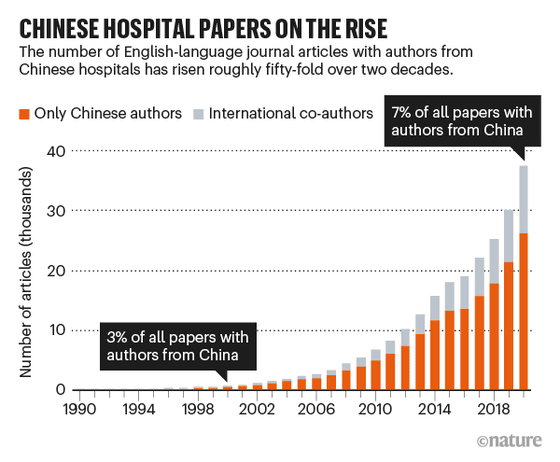Mass-produced 'fake treatises' in China pollute academic journals

No matter how great a scientific discovery is made, it is not publicly recognized unless it is published in the form of a 'treatise', so 'publishing a treatise in an academic journal' is a big thing in the academic world. It has meaning. However, a large number of 'fake treatises' have been submitted, especially in China, just to obtain the result that the treatises have been published, and the academic journal Nature has stated that 'there is a suspicion of fake treatises' after January 2020. Has announced that it will reach more than 1000.
RSC Advances retractions
The fight against fake-paper factories that churn out sham science
https://www.nature.com/articles/d41586-021-00733-5
In January 2021, RSC Advances, a peer-reviewed online journal of the Royal Society of Sciences in the United Kingdom, announced that '68 published papers were found to be fake.' According to a survey by RSC Advances, these fake treatises look legitimate when viewed alone, but when compared between fake treatises, it is clear that the structures or templates are very similar, and the organization. It is thought that it was mass-produced.
According to a Nature survey conducted separately from RSC Advances, 'In recent years, mass-produced fake treatises have spread to academic journals, and mass-produced fake treatises withdrawn by various academic journals after January 2020. There are more than 370 papers, and more than 1000 papers that are 'suspicious'. '
China is considered to be the largest source of these fake treatises. It is said that there is a black market for fake treatises in China. In 2010, a scandal was reported that a business research scholar at Wuhan University wrote a fictitious treatise as a ghost writer, and in 2013, a fake treatise was published. Not only was the research result on the black market published in Science magazine, but in 2017, the Chinese Ministry of Science and Technology directly 'strengthened the crackdown on fake treatises' in response to the report that '107 papers were found to be fake'. I will do it. '
All of the 370 fake treatises withdrawn after January 2020 were also authored by 'Chinese working doctors.' Chinese doctors are often required to 'publish a treatise in an academic journal' as a promotion condition, and in Beijing, 'the promotion to deputy doctor is the first author of the treatise. In August 2020, we stipulated that 'limited to those who have been published in specialized journals.' Since working doctors are busy with their daily work and cannot spend time on research, many working doctors in China purchase fake treatises. In fact, the number of treatises published by working doctors in China has increased rapidly by '50 times' in the last 20 years.

In February 2020, China's Ministry of Science Education notified research institutes, including hospitals, not to judge researchers based solely on the number of published papers, and to abolish the practice of 'giving a bonus for each published paper.' I am giving instructions to. Some people are expecting an effect on these movements, but experts who are actually dealing with fake treatises have stated that 'the number of fake treatises has not decreased.'
The mass-produced fake treatises detected so far are 'using commercial email addresses instead of academic institution-issued email addresses', 'no original data', ' flow cytometry and fluorescently colored cells'. A feature such as 'Insert a good-looking image that seems to be related to the paper at first glance' has been confirmed. However, since these characteristics are common terms extracted from 'fake treatises that are already fake', the common terms of 'fake treatises that are not fake', which are thought to exist in large numbers, are unknown. is. Experts describe the known fake treatise as 'the tip of the iceberg.'
Although academic journals have begun to take measures against these problems of fake treatises, there are problems such as limited cooperation because each journal is independent, and sharing the personal information of problematic treatise authors violates data protection rules. It is said that the 'academic journal world' is not united due to the problem that there is a possibility of doing so. On the other hand, experts have expressed strong concern as it has been confirmed that the technical capabilities of fake treatises are improving.
Related Posts:
in Science, Posted by darkhorse_log







